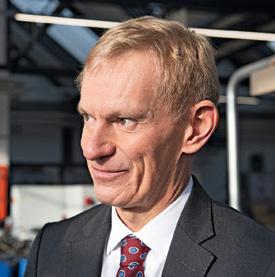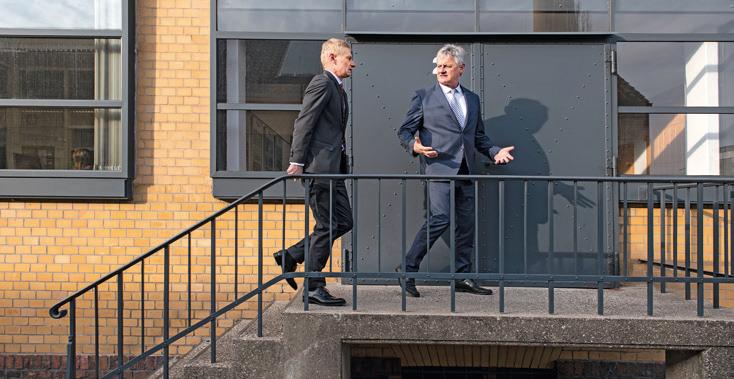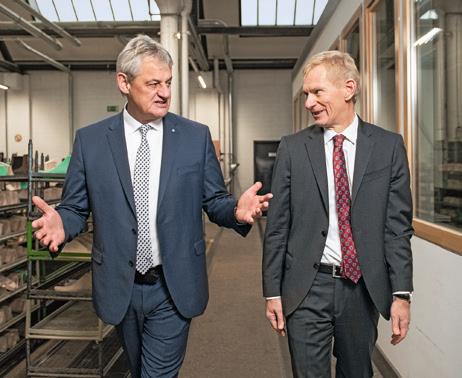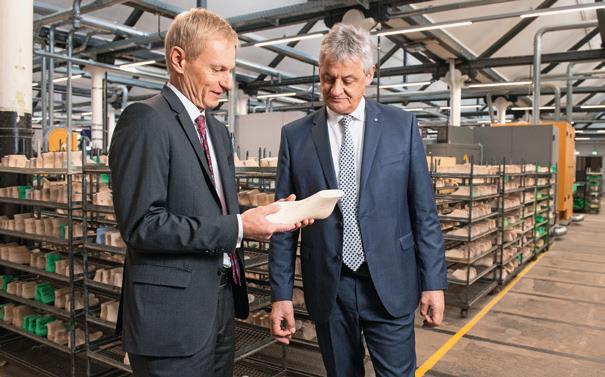
Aloys Schnelte: At Krone we underwent a certain amount of change a few years ago in everything related to corporate culture, employee management and the management structures. These are adjustments that became necessary as a result of demographic change and the increasing automation of company processes. And, of course, we support employees on this path and by helping them to remain healthy, motivated and efficient. How do you see these developments in the context of your position as Chairman of a health insurance company?
Jürgen Peter: Of course, digitisation is the core driver for most change processes that we are currently experiencing. As digital transformations are usually centred on strategy and technology, people are often not brought along with them or involved in them properly. That brings with it a high risk, as it is usually people who are responsible for shaping processes. There is a risk that the changes will fail because the stakeholders have not been properly involved. Their role and their work changes – that’s entirely as it should be: people remain the key factor to success.
Aloys Schnelte: That’s certainly true! The change processes in our company are initiated, shaped and implemented by our managers and employees, and that will remain the case going forward. So, of course, we want them to stay healthy and happy in the long term.
Jürgen Peter: And that’s precisely why the issue of health should be foregrounded even more. In the past, we have often only spoken about it to address the consequences of stress, such as increasing numbers of those who are incapable of work. I think it’s very important to get involved in shaping working conditions that promote health from the outset. Both employees and managers should play an active part in that. As a health insurance company, we support business in taking this path and give advice on the implementation of a company health management system. In doing so, we are able to build on over twenty years of experience.
Jürgen Peter: Of course, digitisation is the core driver for most change processes that we are currently experiencing. As digital transformations are usually centred on strategy and technology, people are often not brought along with them or involved in them properly. That brings with it a high risk, as it is usually people who are responsible for shaping processes. There is a risk that the changes will fail because the stakeholders have not been properly involved. Their role and their work changes – that’s entirely as it should be: people remain the key factor to success.
Aloys Schnelte: That’s certainly true! The change processes in our company are initiated, shaped and implemented by our managers and employees, and that will remain the case going forward. So, of course, we want them to stay healthy and happy in the long term.
Jürgen Peter: And that’s precisely why the issue of health should be foregrounded even more. In the past, we have often only spoken about it to address the consequences of stress, such as increasing numbers of those who are incapable of work. I think it’s very important to get involved in shaping working conditions that promote health from the outset. Both employees and managers should play an active part in that. As a health insurance company, we support business in taking this path and give advice on the implementation of a company health management system. In doing so, we are able to build on over twenty years of experience.
ABOUT THE PERSON

Dr. Jürgen Peter has been running AOK Niedersachsen as its Chairman since March 2005. He was previously Managing Director in the area of corporate development and as Head of Controlling he was responsible for the reorganisation and consolidation of AOK Niedersachsen. Dr. Peter studied Business Management and completed a doctorate on the introduction of lean management and group work into industrial companies.
Aloys Schnelte: If you look at it rationally, there are three production factors: work, land and capital. Work is always about people. If we do not ensure that people can perform to the maximum, we will not achieve good results.
Jürgen Peter: So it’s a win-win situation for everyone involved.
Aloys Schnelte: Yes, and that’s not the only reason why the issue of health should have an established place in corporate and management culture. It’s an individual process: not every employee can keep up the high pace – but that doesn’t make them a bad employee. The challenge is for everyone to develop or keep ready a list of measures that suits their needs. Managers, in particular, are required to support their employees and show them how to cope with new challenges and face up to them without fear. Healthy management and resilience form an important component in our established management development programme.
Jürgen Peter: When it comes to the topics of leadership and self-management, in Lower Saxony we are working on supporting companies with concepts that are fit for the future. Services are more successful if they combine working and learning – only then can it be ensured that what people learn is transferred into their everyday professional lives. Whether we are raising awareness of stress and self-management among employees or training managers in the skills of healthy management – the important thing is that the process runs over the long term and fits in with the company and professional context.

Aloys Schnelte: Many of our customers are smaller medium-sized enterprises: what advice would you give them in this area?
Jürgen Peter: In the innovation project “Health in the world of work 4.0”, in which you are also involved at Krone, we are looking at, among other things, the challenges facing companies in the context of digitisation and how they can face up to them. It quickly became clear in the project that most of the challenges are found repeatedly, irrespective of the commercial sector or the size of the company. Knowledge transfer is a key aspect that we recommend to companies. Businesses from various industries and of different sizes can use the opportunity to learn from one another by sharing their experiences of good and bad practice. We offer the companies participating in our project the chance to share experiences and this has been marked by openness and new ideas from the outset.
Aloys Schnelte: Every workplace and every process is managed differently. I have to work on myself, too: I am still accustomed to very rigid working hours – and that suits me. But flexible working models, such as working from home, working time accounts and remote workplaces are very important and contribute to reconciling family and professional life. As part of their project, we ask employees which issues are important to them and where we can support them. All of them can talk about their wishes, expectations and fears quite openly. As part of our “Progress 2020” project at Krone, we also give them the opportunity to work on new strategic projects themselves in agile project groups and to develop suggestions on how we can improve. And within the company, we are moving away from a rigid form of organisation with a lot of departments and line responsibilities towards networks, agile groups and thus interdisciplinary responsibility. In this context, 'agile' means, above all, that employees are prescribed fewer targets, but they have to keep setting new, short-term ones themselves. An overall objective is specified, but the path to it can be organised as they wish. In our experience, this leads to better and faster results, but also to higher self-motivation and a stronger sense of responsibility. What is known from an academic point of view about stresses caused by digitisation?
“As always, people remain the key factor to success.”
Dr. Jürgen Peter
Jürgen Peter: It has not been investigated sufficiently as yet, but it is clear that it brings both opportunities and risks. That’s the case with almost all digital innovations. For example, the flexibility that is increasingly being required of people can become too much. Removal of boundaries is an important term here: if the feeling of always being contactable takes over, on the one hand companies must set out conditions and expectations, on the other, employees must set boundaries themselves. At the same time, increasing flexibility can bring advantages: the employee has more scope to organise his or her work and they can take more responsibility for their actions. In this context, the manager has a key function, and must address the individual needs of employees and support them as necessary. The effect of the manager as a role model is also an important point.
Aloys Schnelte: What advice can you give to individual employees, how can they deal with these challenges?
Jürgen Peter: Of course, it’s very individual and differs from one workplace to another. In the course of the digitisation of office or production work processes, for example, the level of responsibility of employees can fall or increase – depending on whether the tasks become easier or more complex. For some, the opportunity to work from anywhere is a burden. For others, it creates space and flexibility. I recently had a conversation with someone who can take action via his tablet whenever there are hitches in his employer’s production facility. He can sort things out on a Saturday morning from a cafe on the market place and does not have to drive to the company. For employees, it’s important to engage with the changes and to reflect on what they mean to them. Are they a burden or a resource? It’s important to discuss this with the manager and to get involved. That is the only way that the company can adapt the changes to the requirements and needs of the employees. So what does the ideal world of work 4.0 look like for you?


Aloys Schnelte: From an economic point of view, a high degree of industrialisation and automation is worth striving for, because we simply cannot find sufficient skilled workers any more. Above all, we need people who can monitor and support the processes, in other words, who can think in a holistic way and understand complex issues. Many people see automation and industrialisation extremely negatively. If that were to change and both of these aspects were to merge with an understanding on the part of employees who feel comfortable in their surroundings and are healthy and motivated, that would be the ideal situation.
Jürgen Peter: Commercially, I would also say that higher productivity is a good objective because it creates jobs and brings in more orders for German industry. A corporate culture that focuses on employees can be helpful in retaining employees in your company.
Aloys Schnelte: Productivity and therefore competitiveness are essential for us, but we probably have to attract the people whom we need as employees for this at a much earlier stage than previously. Training systems must be adapted to this – it takes time to achieve this in a company. At the same time, young employees have different expectations of their work, such as the desire for greater flexibility. Krone in Werlte is not exactly at the centre of the universe and we will not be able to attract every engineer to us; so you have to consider other forms of work in team collaboration. What comes out of it is very exciting – you are permanently challenged and you can develop. That’s also important for personal well-being and in turn promotes good health.
Photos: Michael Löwa




